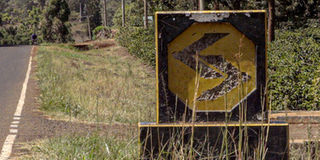Spencon collapse: A lesson to entrepreneurs and startups

Whereas in Uganda Spencon is still under receivership, much of its properties spread in Kenya, Tanzania, Sudan, Malawi, Zambia and Mozambique have been disposed of. PHOTO | COURTESY
What you need to know:
- Fraud. A BBC Africa Eye investigation of the operations of Spencon under two managers appointed by ECP in 2014 with the aim of rescuing the business, uncovered a tale of corruption, fraud.
At its peak, Spencon, a construction company founded by JC Patel, NP Sharma and LR Patel in Kenya in 1979, was a top dollar entity with plans to expand beyond Uganda, Kenya, Tanzania, Sudan, Malawi, Zambia and Mozambique.
With over 200 infrastructure projects executed across eastern and southern Africa, some funded by international donors such as DEG, an arm of the German Development Bank, KfW, US private equity fund Emerging Capital Partners (ECP) invested $15m in Spencon with the aim of listing it onto the Nairobi Stock Exchange by 2012 to 2014.
UK is invested in ECP through UK Aid’s (DFID) wholly-owned by the Commonwealth Development Corporation (CDC) and through the European Investment Bank (EIB).
According to Pragnesh Patel, a son to one of the founders, for five years, the relationship was constructive, up until 2011, when it turned sour.
“However, in mid-2011, ECP conspired to wrestle control from the founders. They did so by manipulating the findings of internal audit reports with the aim of forcefully acquiring all the company’s shares in order to “flip” the company at a huge profit,” he says.
Unknown to the founders at the time, he says, ECP was in secret negotiations with competitors in South Africa and the Middle East who had expressed interest in acquiring the company for which ECP offered to sell 100 per cent of the company’s shares.
Forced to enter an arbitration process, battling expensive and superior lawyers, Patel says, ECP rejected the founders’ proposals for an equitable win-win and instead took over full ownership and management in early 2014.
A BBC Africa Eye investigation of the operations of Spencon under two managers appointed by ECP in 2014 with the aim of rescuing the business, uncovered a tale of corruption, fraud and gross mismanagement.
Steven Haswell, an accountant ran the company’s finances while Andrew Ross, an engineer and overall in-charge of the company operations, were to rescue the business within 18 months and sell it in 2016 or thereafter.
However, it was alleged that the bosses, many of them drawn from UK, led extravagant lifestyle and instead brought the business on its knees in 2016, leaving many unpaid and unemployed.
In Uganda, Spencon is still involved in lawsuits.
Other businesses reported to have suffered a similar fate include Africa Telecommunications, Media and Technology Fund (ATMT Fund), Zuku Television’s parent company.
Takeovers
Equity Funds approach businesses in search of an investment opportunity and are also open to entrepreneurs in search of funds for investment.
Hostile takeovers, which oust a founder of a business are mainly done through massive investment from equity funds or investors through buying shares from other shareholders or even the founder to own a majority stake.
Your company is bought bit-by-bit. With the right sharepower, the fund can make a decision that is not favorable to a founder.
Private equity
African businesses are increasingly attracting private equity as an alternative to debt financing by commercial banks that attach a fat interest rate to the loans.
According to KPMG and East Africa Venture Capital Association (EAVCA) private equity sector survey of East Africa released in 2019, the number of PE funds investing in East Africa increased to 97 between 2017 and 2018 up from 72 recorded in 2015 to 2016.
The survey estimated that of the total $6.4 trillion PE funds raised globally between 2007 and 2018, nearly $33.1 billion is earmarked for Africa and $3.3 billion for East Africa.
In East Africa, Kenya recorded the most deal volumes followed by Uganda which overtook Ethiopia.
In Uganda, the report revealed there was Qatar Investment Authority’s acquisition of Airtel Africa, the energy and natural resource’s sector has seen the most deal activity in recent years, most of which related to Uganda’s oil and gas exploration blocks.
This was closely followed by the financial services sector.
Lesson to entrepreneurs
Private Equity, which is viewed as long term capital, is good for businesses but they must learn to undertake due diligence, Mr Paul Lakuna, a research fellow at Makerere University Economic Policy Research Center, says.
Mr Kabiito Karamagi, the managing partner, Ligomarc Advocates and also receiver of Spencon, says it is important to understand that equity funds are profit oriented.
Their goal is to make money and will act based on the sole purpose of generating money.
“As soon as the business stops making sense to them, they are out and how they get out is dependent on a number of factors,” he says.
For hostile takeovers, he says entrepreneurs must shield themselves with very good legal representation, to counter the expensive and superior lawyers hired by rich equity firms.
“You need to have a good team of financial analysts and good lawyers to articulate what you want and also gauge what they are after and how ready they are to be emotionally involved,” he says, adding business is risky and entrepreneurs cannot shy away from investment but must ensure it is tethered to its values.
“Look for investors with whom you have common values. When you have common values, there is little chance of conflict,” he says.




